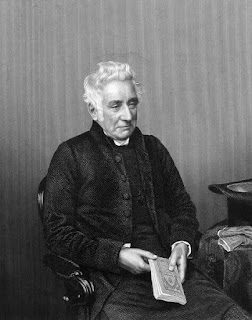"A liberty is here allowed": Lonsdale on the Prayer Book and Baptismal regeneration
for there appears to me no reason why, as a Minister of the Church of England, you should feel yourself at all called upon to go beyond the view of Baptismal Regeneration which is stated by Wall in the passage quoted by you. How this can be deemed 'a rationalistic view,' I am at a loss to conceive. Neither can I see how any man can take upon himself to say what the formularies of the Church imply. We can only judge of what is expressed. Of course, as you say, different constructions may be put upon expressions, where the Church has not explained them: and I think (as I have said already) that the construction put upon the language of the Church in the instance before us by Wall is rational (not rationalistic), as well as Scriptural: and is in agreement with Articles 16 and 27.
they hold that God, by his Spirit, does at the time of baptism seal and apply to the infant that is there dedicated to him the promises of the covenant of which he is capable, viz . adoption, pardon of sin, translation from the state of nature to that of grace, &c. On which account the infant is said to be regenerated of (or by) the Spirit. Not that God does by any miracle at that time illuminate or convert the mind of the child. And for original sin, or the corruption of nature, they hold that God by his covenant does abolish the guilt of it, receives the child to his mercy in Christ, and consigns to him by promise such grace as shall afterward, by the use of means, if he live, be sufficient to keep it under, but not wholly to extirpate it in this life. It is left as the subject of trial and of a continual Christian warfare. And this is the opinion of St. Austin and of the ancients in general.
But it appears to me that the same Church nowhere exactly defines what she means by Regeneration: and therefore I conceive that a liberty is here allowed to her members, and to her ministers also.
He continued by referring to Article 25 and the Catechism:
neither the one nor the other defines the measure of grace given; or presumes to say when it begins, or whether it ever ceases to work.
In other words, Lonsdale was stating that subscription to the Formularies provided significant latitude for ministers when it came to understanding the meaning of regeneration in the Sacrament of Baptism. There are some similarities between Lonsdale's affirmations and the Gorham Judgement, a reminder of voices in the Old High tradition which - while heartily disliking the Calvinism espoused by the Reverend George Cornelius Gorham - would wisely not go beyond Wall's modest account of Baptismal regeneration, such irenicism wisely ensuring that the Prayer Book's Baptismal office continued to determine pastoral practice and sacramental piety, without straining the conscience of clergy.
This was also the view stated in the Preface to the Church of Ireland's 1878 revision of the Prayer Book. Regarding the Baptismal office, it stated:
we desire fully to recognize the liberty of expounding these Formularies hitherto allowed by the general practice of the Church.
Once again, then, we see how the Irish revision, rather than being regarded - as it conventionally is - as 'low church', actually reflected significant Old High concerns.
Lonsdale's 1847 letter also, however, included an important challenge to Calvinistic assumptions when administering the Sacrament of Baptism:
Your scruple as to the giving of the Holy Ghost, 'when, as is too often the case, no prayers are really offered by those who bring the child to baptism,' appears to me to be still less one which ought to disquiet you. The Church frames her services throughout upon the assumption that her worshippers are spiritual worshippers: nor is it easy to see how they could have been proved otherwise.
But whatever may be the case with those who bring the child to baptism, you at least offer prayers on its behalf; and you may fairly presume, or at least must charitably suppose, that other ministers pray likewise, and administer the Sacrament in faith. And is it not reasonable to hope that God will accept the child for the one that does well, and not reject it for the others that do ill though even of these perhaps one ought hardly to say with confidence that they are altogether faithless and godless, and offer no prayers in their hearts, when they bring the child to baptism.




Comments
Post a Comment